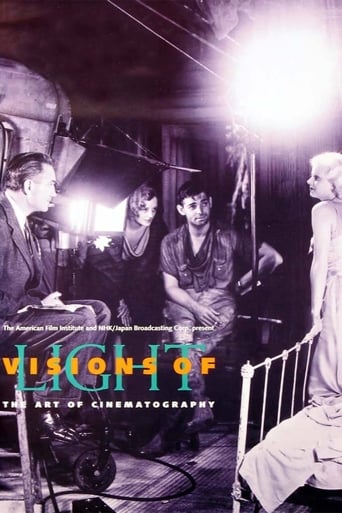poe426
Early on in my movie-going, I came to appreciate a beautifully-shot film, even if there were other aspects (like the story, or the performances, etc.) that weren't up to par- a movie like STREETS OF FIRE, for instance. The LOOK of such a movie outshone its multitude of sins. (Nor is it alone: I simply reference it because it was the first to spring to mind.) While VISIONS OF LIGHT doesn't touch on the career of Ted Tetzlaff (who directed THE WINDOW, a truly outstanding film noir) or a lot of other cinematographers worthy of note, we DO get an appreciation for the works of people like Gordon Willis. To do justice to the craft would take a maxi-series (as opposed to a "mini" series), but, until then, we can make do with VISIONS OF LIGHT.
Arne Reisegg Myklestad
Taking a stand for cinema's populist underdog, Visions of light reinstates the basic elements of importance in film in an age where the artistic merit is credited the director and the actors. Or maybe it merely tells an audience what every filmmaker knows so well; that the art of film would be nothing without light and the craft of capturing and animating it. Since the origin of film-making, cinematography has maintained its reputation of being a craft, long after the role of the director was given creative control. And with such a responsibility in management of physical and optical parameters, the creative expression of the director of photography is purely based on experiment through immense control. From Charles Lang being instructed to "put his shadows wherever he wanted, but not on the actors face" to David Lynch and Frederick Elmes discussing "how dark is dark", the art of cinematography is just as much about being an illusionist as just a mediator between production and aspection. In commentary to his "sketching of things in the dark" to the point of monochromism, John Alton summed up the spirit of cinematography in reminding us that it is not as much about the lights you turn on as the one's you don't.
moonspinner55
Documentary on the art of cinematography, with a handful of revered directors of photography reflecting on their heroes and mentors, on films which inspired them and (selected) projects they've worked on. Despite a lot of smart talk and amusing anecdotes, this project is colorful and entertaining without being especially enlightening (for instance, only Gordon Willis cites a regret--a sequence from "The Godfather Part II"). Some incredible (and Oscar-winning) DP's like Geoffrey Unsworth, Harry Stradling and Peter Bizou are not even invited to the fore, which is disappointing, and the film clips are certainly on the lean side (hardly anything from the 1950s), but what is here is enjoyable, if not intriguing. Financed by the American Film Institute for PBS and Japanese equivalent NHK. **1/2 from ****
Glenn Andreiev
The magical glow Marlene Dietrich gave off in her vintage exotic films, the almost news-coverage like grit of DOG DAY AFTERNOON, the realistic look of JAWS- all the secrets of how to make a film look it's best possible are here in this excellent American Film Institute produced documentary. VISIONS OF LIGHT traces the history of cinematography in simple, everyman terms (No, we don't have cameramen using jargon like "f stops, ground glass, neutral density.") The film clips from such beautifully lensed films as SUNRISE, GRAPES OF WRATH, REBECCA, T-MEN, PICNIC, IN COLD BLOOD, TAXI DRIVER and BLADERUNNER) perfectly highlight the film. A true must see.


